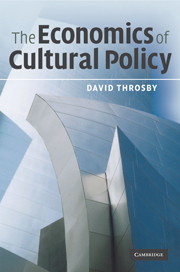Book contents
- Frontmatter
- Contents
- Preface
- Acknowledgments
- Abbreviations
- 1 Introduction
- 2 The scope of cultural policy
- 3 The policy process
- 4 Arts policy
- 5 Cultural industries
- 6 Cultural heritage
- 7 Culture in urban and regional development
- 8 Tourism
- 9 Culture in the international economy
- 10 Cultural diversity
- 11 Arts education
- 12 Culture in economic development
- 13 Intellectual property
- 14 Cultural statistics
- 15 Conclusions
- References
- Name index
- Subject index
12 - Culture in economic development
Published online by Cambridge University Press: 05 June 2012
- Frontmatter
- Contents
- Preface
- Acknowledgments
- Abbreviations
- 1 Introduction
- 2 The scope of cultural policy
- 3 The policy process
- 4 Arts policy
- 5 Cultural industries
- 6 Cultural heritage
- 7 Culture in urban and regional development
- 8 Tourism
- 9 Culture in the international economy
- 10 Cultural diversity
- 11 Arts education
- 12 Culture in economic development
- 13 Intellectual property
- 14 Cultural statistics
- 15 Conclusions
- References
- Name index
- Subject index
Summary
We must … vigorously develop the cultural industry, launch major projects to lead the industry as a whole, speed up the development of cultural industry bases and clusters of cultural industries with regional features, nurture key enterprises and strategic investors, create a thriving cultural market and enhance the industry's international competitiveness.
(Hu Jintao, 2007)Introduction
There is a sense in which culture is closer to the surface in the developing world than it is in industrialised countries. No doubt the idealised vision of the agrarian economy peopled by happy peasants living and working in harmony with the land and their culture is and always has been far removed from the grim realities of subsistence survival in poorer countries. Yet one cannot spend any time in a developing country without becoming aware of the extent to which cultural traditions and inherited knowledge, practices and values permeate the conduct of domestic, social and commercial life in the countryside and in towns and villages, if not also in at least some parts of the larger cities. In these environments the pervasive presence of culture in its various manifestations is taken for granted, is part of everyday existence and is not in any direct sense a matter of policy concern. Indeed, up until now, cultural policy as an explicit aspect of government action has been virtually non-existent in many parts of the Third World; perhaps there has been some concern for protecting cultural heritage, or some support for traditional arts practice, or some effort to promote the arts in education, but rarely much more than that.
- Type
- Chapter
- Information
- The Economics of Cultural Policy , pp. 191 - 198Publisher: Cambridge University PressPrint publication year: 2010



